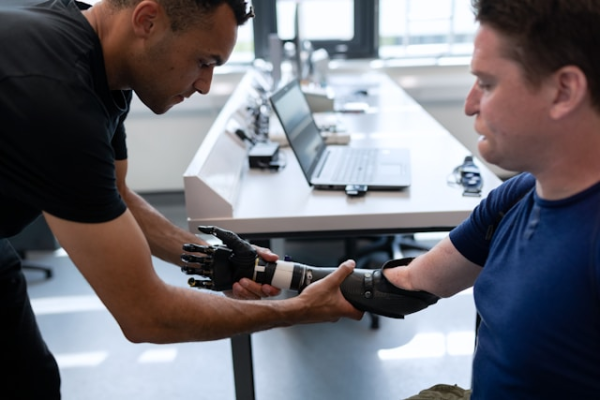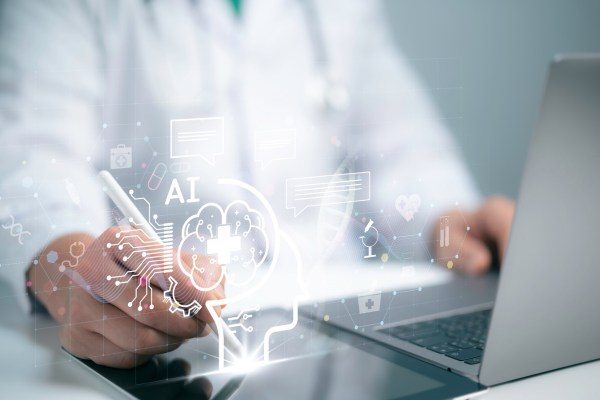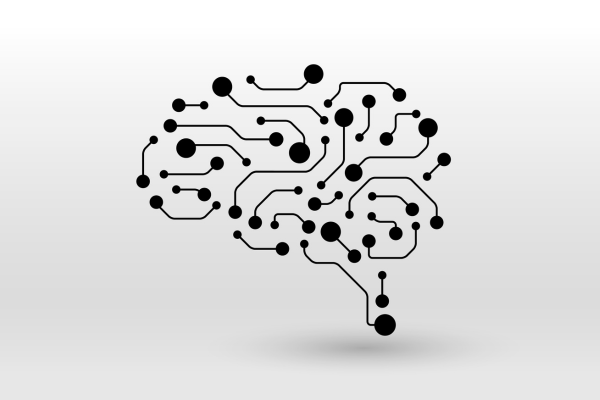The Top 5 Changes We Could See in Healthcare Due to Artificial Intelligence

The integration of Artificial Intelligence (AI) into healthcare marks a revolutionary leap in how we approach medicine and patient care. AI's potential to transform healthcare is vast, from enhancing diagnostic accuracy to personalising patient treatment plans. This article delves into the top five changes we could see in healthcare due to the advent of AI, exploring the implications for both patients and healthcare providers.
What is Artificial Intelligence in Healthcare?
Artificial Intelligence (AI) in healthcare refers to the use of complex algorithms and software to emulate human cognition in the analysis, interpretation, and understanding of complicated medical and healthcare data. Unlike traditional healthcare models, AI has the potential to analyse vast amounts of data and draw insights at unprecedented speed and accuracy. This could completely alter the healthcare landscape as we know it. AI in the medical field encompasses several key components:
- Machine Learning: This involves algorithms learning from data, identifying patterns, and making decisions with minimal human intervention. Machine learning is particularly influential in diagnosing diseases, predicting patient outcomes, and personalising patient treatments.
- Natural Language Processing (NLP): This facet of AI enables computers to understand and interpret human language. In healthcare, NLP is used to sift through unstructured clinical notes, organise large datasets of patient information, and even assist in real-time communication with patients.
- Robotics: While more associated with physical tasks, robotics in healthcare often integrates AI for precision in surgeries, rehabilitation, and supporting those with chronic conditions or disabilities.
The Future and Challenges
AI in healthcare is not without its challenges, such as data privacy concerns, the need for large and diverse datasets, and ensuring the ethical use of AI. However, as technology evolves and these challenges are addressed, AI stands to change the healthcare sector for the better, offering more precise, efficient, and personalised medical care. This transformative technology is set to redefine our approach to health and wellness, promising a future of innovative and improved healthcare solutions.
Top 5 Changes We Could See in Healthcare Due to Artificial Intelligence
Now that we have a better understanding of how AI works in the world of healthcare, let’s take a look at what potential impacts this technology could have. Below, we’ve provided our top 5 changes that we expect to see in healthcare as a result of this transformative technology:
Enhanced Diagnostic Accuracy
One of the most significant impacts of AI in healthcare is the enhancement of diagnostic accuracy. AI algorithms, particularly in the field of radiography, are becoming increasingly adept at analysing medical images. These algorithms can detect nuances in X-rays, MRIs, and CT scans that might elude the human eye. This advancement means quicker and more accurate diagnoses of conditions like cancers, fractures, and neurological disorders.
AI goes beyond analysing existing conditions; it's also paving the way for predictive diagnostics. By analysing large datasets, AI can identify patterns that indicate a risk of developing certain diseases. This foresight enables early intervention, potentially reducing the severity of diseases and even preventing them altogether.
Personalised Medicine
AI’s ability to analyse vast amounts of data extends to personalising patient care. By considering a patient's genetic makeup, lifestyle, and even environmental factors, AI can help healthcare providers create highly tailored treatment plans. This tailored approach promises to improve treatment outcomes and reduce the risk of adverse drug reactions.
Wearable technology and AI can continuously monitor patient health, providing real-time data to healthcare providers. This monitoring allows for dynamic adaptation of treatment plans based on the patient's progress and changing needs. This aspect of AI is particularly beneficial for managing chronic conditions like diabetes and heart disease.
Improved Patient Engagement and Compliance
Patient engagement is crucial for successful treatment outcomes. AI-enabled apps and tools are making it easier for patients to manage their health. From medication reminders to dietary suggestions, these tools help patients adhere to their treatment plans and make informed decisions about their health.
AI chatbots and virtual health assistants provide patients with instant access to medical information and guidance. This technology can answer questions, offer support, and even help with symptom assessment, improving patient engagement and satisfaction.
Streamlining Healthcare Administration
A significant portion of healthcare costs and time is attributed to administrative tasks found in non-clinical roles. AI can automate many of these tasks, such as appointment scheduling, patient data entry, and document processing. This automation not only reduces the burden on healthcare staff but also minimises errors and speeds up processes, leading to more efficient healthcare delivery.
AI looks to play a big role in managing the vast amount of data generated in healthcare. From patient records to research data, AI can organise, analyse, and present this data in a meaningful way. This capability aids in decision-making, policy formulation, and research, contributing to overall healthcare improvement.
Advancing Medical Research and Drug Development
The process of drug discovery and development is time-consuming and costly. AI can analyse complex biological data and simulate drug interactions, significantly speeding up the discovery process. This acceleration could lead to more effective treatments being available sooner and at a lower cost. Although not related to healthcare, AI managed to discover millions of new materials essentially overnight. This type of discovery in medicine could completely revolutionise how drugs are developed.
AI can improve the efficiency of clinical trials by identifying suitable candidates, monitoring trial progress, and analysing results. This efficiency not only speeds up the trial process but also enhances the safety and efficacy of new treatments.
The Future of Healthcare is Brighter With AI
The integration of AI into healthcare is not just a futuristic concept; it's a present reality that's continually evolving. As AI technologies become more advanced and widespread, their impact on healthcare will only grow. Enhanced diagnostic accuracy, personalised medicine and advanced medical research are just the beginning. With AI, the potential for transformative changes in healthcare is boundless, promising a future where medical care is more accurate, efficient, and patient-centred than ever before.
If you’re looking to stay ahead of the technology curve in healthcare, then transitioning towards locum roles could be the perfect opportunity for you. Locum work in healthcare allows you to upskill effectively, ensuring that you’ll be at the forefront of the industry with the right skills that allow you to work with AI. To learn more or discuss the impacts of AI further, please get in touch with our team at Globe Locums or browse ourlatest vacancies here.

Candidate Registration
Registering with Globe couldn't be easier. Simply fill in the form below and one of our experienced recruitment professionals will contact you within 24 hours





